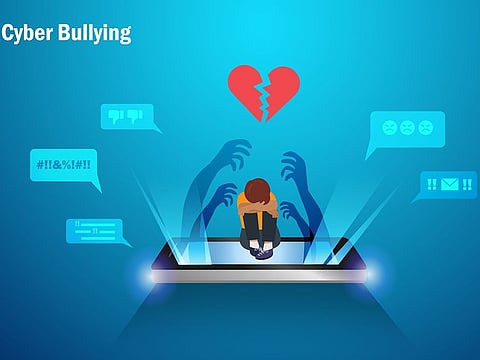Cyberbullying: Why a 12-year-old UAE girl had to leave her school
UAE’s Cyber Security Council urges parents to engage with child’s online life

Dubai: A 12-year-old child in the UAE was pushed to her limits, after she was exposed to relentless cyberbullying, forcing her to leave her school and turning her life upside down.
The UAE’s Cyber Security Council took to its social media channels on October 11, to share a true story of the child, identified as ‘Sarah’ in the UAE, and raise awareness on the impact it can have on children.
Why children are vulnerable to cyber harassment
Even though many social media platforms have a minimum age limit of 13, children can bypass these requirements relatively easily, if parents don’t pay attention. And even if they are not on any of the popular social media platforms, there are still options for connecting online with their friends, like the chat options on their school’s messaging board, or other third-party apps.
In Sarah’s case, text messages, social media posts and altered images that were shared on group chats, all played a role in pushing her to take the decision to leave her school.
“Cyberbullying can leave deep emotional wounds and long-lasting effects but parents can take steps to protect their children,” the council said.
They also shared some tips that parents can follow:
How to report online content
Recently, the UAE’s Telecommunications and Digital Government Regulatory Authority (TDRA) also concluded its campaign on children’s online safety, in which parents were encouraged to practise caution with their own profiles, as they may inadvertently share details of their children’s lives, compromising on their security. TDRA also encouraged parents to report and block such content and users, to enable the authority to enhance digital security for children.
In its guide on online safety for children, the United Nations Children's Fund (Unicef) encourages parents to have honest conversations with their children about who they communicate with and how, and who can see what they post online.
The guide post goes on to state: “If your child experiences something online that makes them feel upset, uncomfortable or scared, encourage them to tell you or a trusted adult immediately. Children often ‘know’ the perpetrators of online harassment or abuse, so it is important to help them to be alert and know how to respond to any problematic behaviours they encounter online. Work with your child to establish rules on how, when and where to use devices.”
If you want to learn how to set up parental controls on your child’s social media use, read our detailed guide here.
But even with parental controls, children may still get exposed to cyberbullying and harassment, which is why authorities urge parents to take a more active role in their child’s online presence.
What is the appropriate amount of screen time for children?
Last month, guidelines issued by Sweden’s public health authority were in the news, for the screen time recommendations they had shared for children, which were significantly lower than the current habits of children:
Child psychologists who spoke with Gulf News agreed with the recommendations, citing the damaging effects of long hours on the screen on children’s mental, emotional, psychological and physical wellbeing.
How to report online child harassment in the UAE
Ministry of Interior has a Child Protection Centre ‘Hemayati’, where you can report any cases of online harassment and bullying of children:
Sign up for the Daily Briefing
Get the latest news and updates straight to your inbox



